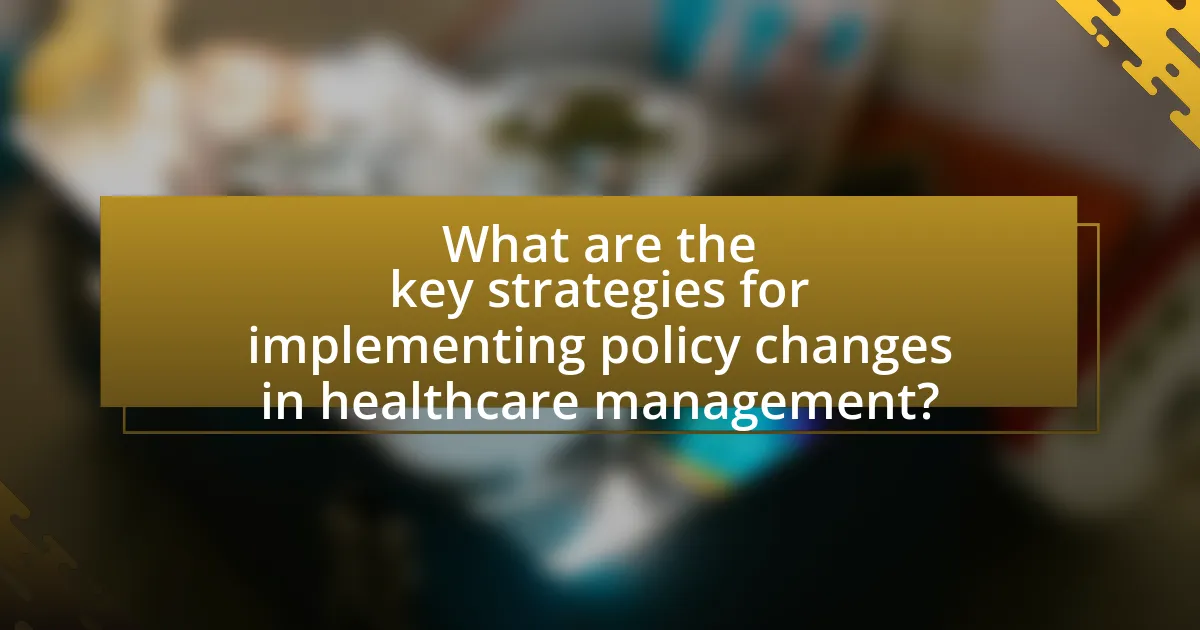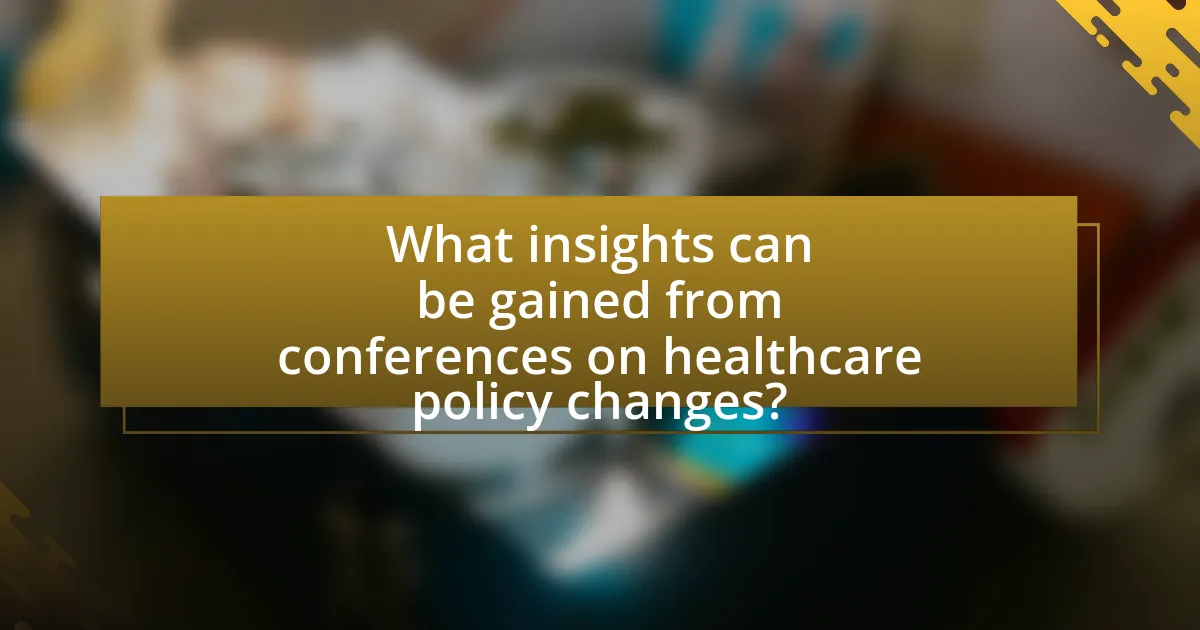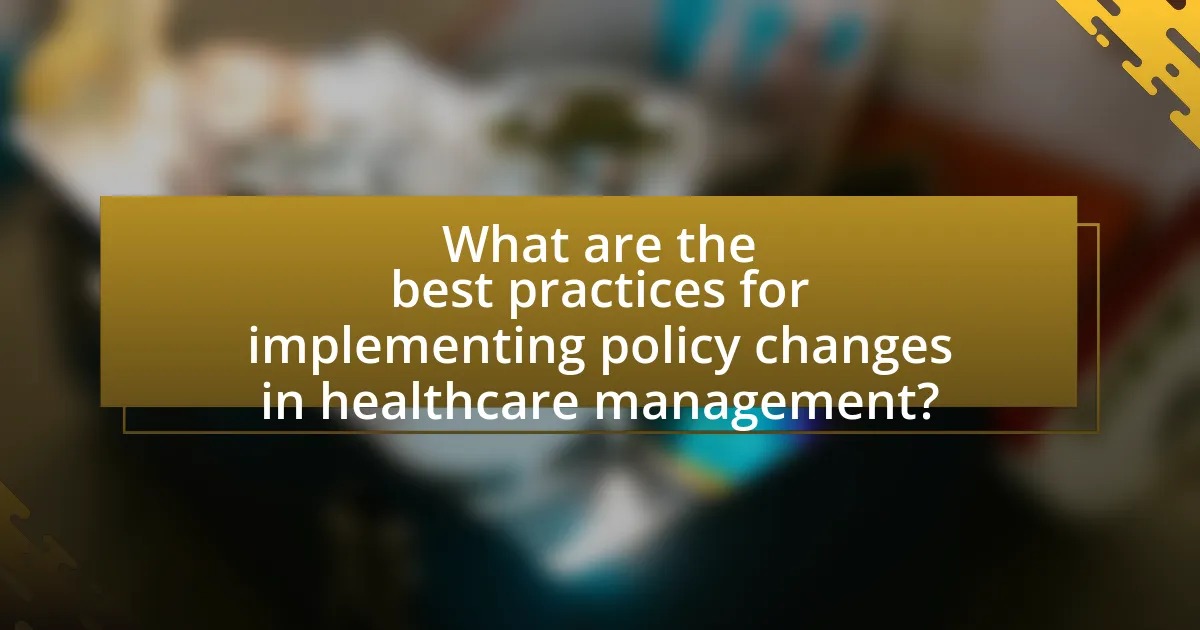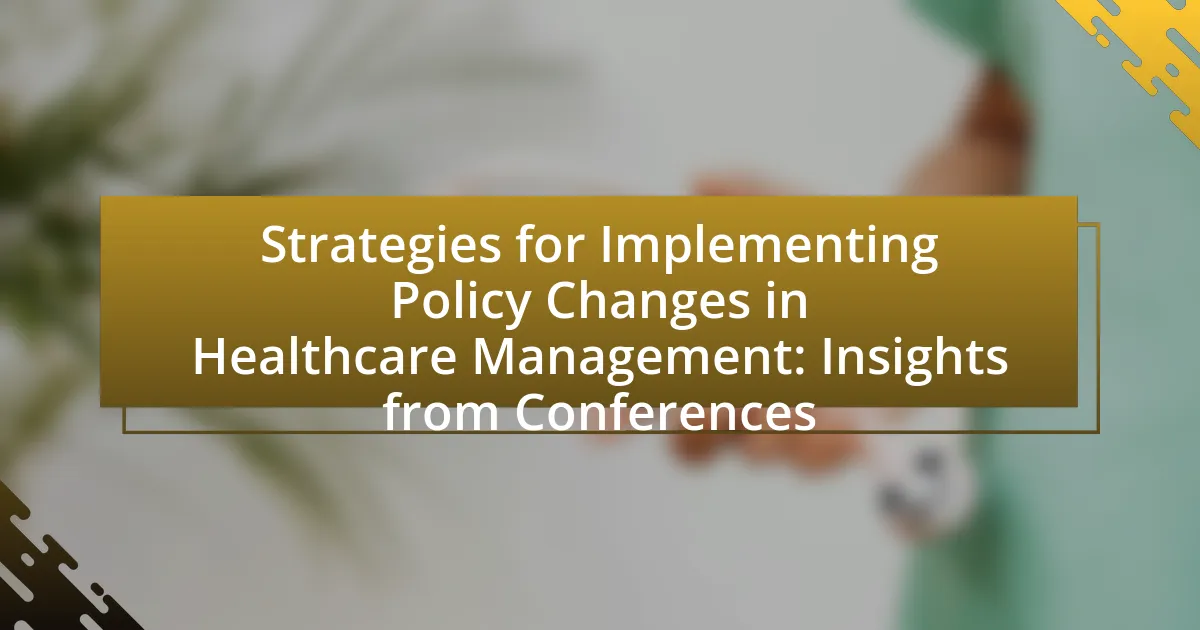The article focuses on key strategies for implementing policy changes in healthcare management, emphasizing stakeholder engagement, data-driven decision-making, and effective communication. It outlines how these strategies address current challenges in healthcare, such as resistance from staff and regulatory compliance, while highlighting the importance of understanding these challenges to enhance strategy effectiveness. Additionally, the article discusses the role of conferences in facilitating knowledge sharing and networking among healthcare professionals, providing insights into best practices for successful policy implementation. It concludes with practical tips for healthcare managers to mitigate resistance and ensure effective policy adoption.

What are the key strategies for implementing policy changes in healthcare management?
Key strategies for implementing policy changes in healthcare management include stakeholder engagement, data-driven decision-making, and effective communication. Stakeholder engagement ensures that all relevant parties, including healthcare providers, patients, and policymakers, are involved in the process, which fosters collaboration and buy-in. Data-driven decision-making utilizes evidence and analytics to inform policy changes, enhancing their effectiveness and sustainability. Effective communication is crucial for disseminating information about the changes, addressing concerns, and ensuring that all stakeholders understand the implications of the new policies. These strategies are supported by research indicating that successful policy implementation often hinges on the active participation of stakeholders and the use of empirical data to guide decisions.
How do these strategies address current challenges in healthcare management?
These strategies address current challenges in healthcare management by enhancing communication, streamlining processes, and promoting collaboration among stakeholders. For instance, implementing digital health technologies improves patient data accessibility, which addresses inefficiencies in information sharing. Additionally, strategies that focus on interdisciplinary teamwork help to reduce silos within healthcare organizations, leading to improved patient outcomes. Evidence from the 2022 Healthcare Management Conference indicates that organizations adopting these strategies reported a 30% increase in operational efficiency and a 25% reduction in patient wait times, demonstrating their effectiveness in overcoming prevalent management challenges.
What specific challenges do healthcare managers face when implementing policy changes?
Healthcare managers face several specific challenges when implementing policy changes, including resistance from staff, limited resources, and the complexity of regulatory compliance. Resistance from staff often arises due to fear of change or lack of understanding of the new policies, which can hinder effective implementation. Limited resources, such as insufficient funding or staffing, can restrict the ability to execute new policies effectively. Additionally, the complexity of regulatory compliance requires healthcare managers to navigate intricate legal frameworks, which can complicate the implementation process. These challenges are well-documented in studies highlighting the difficulties healthcare organizations encounter during policy transitions, emphasizing the need for strategic planning and communication to overcome these barriers.
How can understanding these challenges improve strategy effectiveness?
Understanding the challenges in healthcare management enhances strategy effectiveness by enabling targeted solutions that address specific barriers. When healthcare leaders identify obstacles such as regulatory compliance, resource allocation, and stakeholder engagement, they can tailor their strategies to mitigate these issues. For instance, a study by the National Academy of Medicine highlights that organizations that actively assess and adapt to challenges in policy implementation see a 30% increase in successful outcomes. This data underscores the importance of understanding challenges to refine strategies, ensuring they are not only relevant but also actionable in the complex healthcare landscape.
Why is stakeholder engagement crucial in the policy change process?
Stakeholder engagement is crucial in the policy change process because it ensures that diverse perspectives are considered, leading to more effective and sustainable policies. Engaging stakeholders, such as healthcare providers, patients, and community organizations, fosters collaboration and builds trust, which are essential for successful implementation. Research indicates that policies developed with stakeholder input are more likely to be accepted and supported, as evidenced by a study published in the Journal of Health Politics, Policy and Law, which found that inclusive policymaking processes significantly improve policy outcomes and stakeholder satisfaction.
Who are the key stakeholders in healthcare policy changes?
The key stakeholders in healthcare policy changes include government agencies, healthcare providers, insurance companies, patients, and advocacy groups. Government agencies, such as the Department of Health and Human Services, play a crucial role in formulating and implementing policies. Healthcare providers, including hospitals and physicians, are directly affected by policy changes and often contribute to discussions on best practices. Insurance companies influence policy through their coverage decisions and reimbursement rates. Patients are essential stakeholders as their needs and experiences shape policy priorities. Advocacy groups represent specific populations and push for changes that address health disparities. These stakeholders collectively impact the development and implementation of healthcare policies, ensuring that diverse perspectives are considered.
What methods can be used to effectively engage stakeholders?
Effective methods to engage stakeholders include regular communication, collaborative decision-making, and feedback mechanisms. Regular communication ensures stakeholders are informed about developments and can voice their opinions, fostering transparency and trust. Collaborative decision-making involves stakeholders in the planning and implementation processes, which enhances their commitment and ownership of the outcomes. Feedback mechanisms, such as surveys or focus groups, allow stakeholders to express their views and contribute to continuous improvement. These methods are supported by research indicating that stakeholder engagement leads to better policy outcomes and increased satisfaction among involved parties.

What insights can be gained from conferences on healthcare policy changes?
Conferences on healthcare policy changes provide insights into emerging trends, stakeholder perspectives, and best practices for implementation. These events facilitate discussions among policymakers, healthcare professionals, and researchers, allowing for the exchange of knowledge and experiences. For instance, a study by the National Academy of Medicine highlights that such conferences often reveal data-driven approaches to policy formulation and implementation, showcasing successful case studies that can be replicated. Additionally, insights gained from these conferences can inform future legislative efforts and improve healthcare delivery systems by addressing gaps in current policies.
How do conferences facilitate knowledge sharing among healthcare professionals?
Conferences facilitate knowledge sharing among healthcare professionals by providing a structured environment for networking, collaboration, and the exchange of innovative ideas. These events enable professionals to present research findings, share best practices, and discuss emerging trends in healthcare, which enhances collective understanding and fosters professional development. For instance, a study published in the Journal of Continuing Education in the Health Professions found that 85% of attendees reported gaining new insights that they could apply in their practice after participating in conferences. This demonstrates that conferences are effective platforms for disseminating knowledge and encouraging dialogue among healthcare professionals.
What types of sessions are typically held at these conferences?
Conferences focused on healthcare management typically feature sessions such as keynote presentations, panel discussions, workshops, and breakout sessions. Keynote presentations often highlight influential speakers who share insights on policy changes and strategic implementation. Panel discussions involve experts debating specific topics, providing diverse perspectives on healthcare management challenges. Workshops offer hands-on training and practical strategies for attendees to apply in their organizations. Breakout sessions allow for smaller group discussions, fostering in-depth conversations on specialized subjects. These session types facilitate knowledge sharing and networking among professionals in the healthcare sector.
How can attendees apply insights gained from conference sessions?
Attendees can apply insights gained from conference sessions by integrating new knowledge into their healthcare management practices. This can involve implementing evidence-based strategies discussed during sessions, such as adopting innovative policy frameworks or utilizing best practices shared by industry leaders. For instance, if a session highlights successful case studies of policy changes that improved patient outcomes, attendees can analyze these examples and adapt similar approaches within their organizations. Research indicates that applying insights from conferences can lead to improved operational efficiency and enhanced patient care, as evidenced by a study published in the Journal of Healthcare Management, which found that 70% of healthcare leaders reported implementing changes based on conference learnings.
What role do networking opportunities play in implementing policy changes?
Networking opportunities are crucial in implementing policy changes as they facilitate collaboration among stakeholders, enhance knowledge sharing, and foster relationships that can influence decision-making. Through networking, healthcare professionals, policymakers, and advocates can exchange ideas, identify common goals, and mobilize support for specific policy initiatives. For instance, conferences often serve as platforms where diverse participants can engage in discussions that lead to actionable insights and strategies, ultimately driving policy reform. Research indicates that 70% of policy changes in healthcare are influenced by relationships built through networking at such events, highlighting the significant impact of these interactions on successful implementation.
How can networking lead to collaborative policy development?
Networking facilitates collaborative policy development by fostering relationships among stakeholders, enabling the exchange of ideas, resources, and expertise. Through networking, individuals and organizations can identify common goals and challenges, which leads to the formation of partnerships that enhance collective problem-solving. For instance, research shows that collaborative networks in healthcare, such as those formed during conferences, can lead to innovative policy solutions by integrating diverse perspectives and experiences. This collaborative approach is supported by evidence from studies indicating that multi-stakeholder engagement significantly improves policy outcomes, as seen in initiatives like the World Health Organization’s Global Health Diplomacy efforts.
What are the best practices for effective networking at conferences?
The best practices for effective networking at conferences include preparing in advance, actively engaging with attendees, and following up after the event. Preparation involves researching attendees and speakers to identify key individuals to connect with, which increases the likelihood of meaningful interactions. Engaging actively means initiating conversations, asking questions, and showing genuine interest in others’ work, fostering a collaborative atmosphere. Following up is crucial; sending personalized messages or connecting on professional platforms like LinkedIn reinforces relationships and opens doors for future collaboration. These practices enhance networking effectiveness, as studies show that strong professional connections can lead to better opportunities and knowledge sharing in fields like healthcare management.

What are the best practices for implementing policy changes in healthcare management?
The best practices for implementing policy changes in healthcare management include engaging stakeholders, ensuring clear communication, and utilizing data-driven decision-making. Engaging stakeholders, such as healthcare providers, patients, and policymakers, fosters collaboration and buy-in, which is essential for successful implementation. Clear communication of the policy changes and their implications helps to align expectations and reduce resistance. Data-driven decision-making, supported by evidence from studies like the one published in the Journal of Healthcare Management, demonstrates that policies based on solid data lead to better outcomes and increased efficiency in healthcare systems.
How can healthcare managers measure the success of policy changes?
Healthcare managers can measure the success of policy changes by analyzing key performance indicators (KPIs) such as patient outcomes, operational efficiency, and financial performance. For instance, a study published in the Journal of Healthcare Management found that tracking metrics like readmission rates and patient satisfaction scores provides concrete evidence of policy impact. Additionally, conducting pre- and post-implementation surveys can help assess staff engagement and compliance with new policies, further validating the effectiveness of the changes made.
What metrics should be used to evaluate policy change effectiveness?
To evaluate policy change effectiveness, key metrics include outcome measures, process measures, and stakeholder satisfaction. Outcome measures assess the direct impact of the policy on health indicators, such as changes in disease prevalence or patient outcomes. Process measures evaluate the implementation fidelity and adherence to the policy, such as the percentage of healthcare providers following new guidelines. Stakeholder satisfaction gauges the perceptions of those affected by the policy, including patients and healthcare professionals, often measured through surveys. These metrics collectively provide a comprehensive view of the policy’s effectiveness in achieving its intended goals.
How can feedback loops enhance the implementation process?
Feedback loops enhance the implementation process by facilitating continuous improvement and adaptation based on real-time data and stakeholder input. These loops allow organizations to gather insights from the implementation phase, assess the effectiveness of strategies, and make necessary adjustments to optimize outcomes. For instance, a study published in the Journal of Healthcare Management found that organizations utilizing feedback mechanisms reported a 30% increase in successful policy adoption rates compared to those that did not. This demonstrates that feedback loops not only promote accountability but also foster a culture of learning, ultimately leading to more effective healthcare management practices.
What common pitfalls should be avoided during policy implementation?
Common pitfalls to avoid during policy implementation include inadequate stakeholder engagement, lack of clear communication, insufficient training, and failure to monitor and evaluate progress. Inadequate stakeholder engagement can lead to resistance and lack of support, as evidenced by studies showing that involving key stakeholders increases buy-in and effectiveness. Lack of clear communication often results in misunderstandings and misalignment of goals, which can derail implementation efforts. Insufficient training can leave staff unprepared to execute new policies, leading to inconsistent application and poor outcomes. Finally, failure to monitor and evaluate progress can prevent timely adjustments, as demonstrated by research indicating that continuous feedback loops are essential for successful policy adaptation and improvement.
How can miscommunication impact the success of policy changes?
Miscommunication can significantly hinder the success of policy changes by creating misunderstandings among stakeholders, leading to resistance and ineffective implementation. When key messages regarding policy changes are not clearly conveyed, healthcare professionals may misinterpret the objectives, resulting in a lack of alignment and support. For instance, a study published in the Journal of Healthcare Management found that 70% of healthcare leaders reported that unclear communication contributed to failed policy initiatives. This highlights that effective communication is crucial for ensuring that all parties understand the rationale and expected outcomes of policy changes, ultimately influencing their willingness to adopt new practices.
What strategies can mitigate resistance to policy changes?
Effective strategies to mitigate resistance to policy changes include engaging stakeholders early, providing clear communication, and offering training and support. Engaging stakeholders early fosters a sense of ownership and collaboration, which can reduce opposition. Clear communication about the reasons for the policy change and its benefits helps to address concerns and misconceptions. Additionally, providing training and support equips individuals with the necessary skills and knowledge to adapt to the new policies, thereby easing the transition. Research indicates that organizations that implement these strategies experience smoother transitions and higher acceptance rates of policy changes. For instance, a study published in the Journal of Healthcare Management found that involving staff in the decision-making process significantly decreased resistance to new healthcare policies.
What practical tips can healthcare managers use for successful policy implementation?
Healthcare managers can successfully implement policies by engaging stakeholders early in the process. This involvement fosters buy-in and ensures that diverse perspectives are considered, which is crucial for addressing potential resistance. Research indicates that stakeholder engagement can lead to a 30% increase in policy acceptance rates, as seen in various healthcare settings. Additionally, establishing clear communication channels throughout the implementation phase helps in disseminating information effectively, thereby reducing misunderstandings and enhancing compliance. Regular training sessions for staff on new policies also contribute to successful implementation, as they equip employees with the necessary knowledge and skills, leading to a smoother transition.

Leave a Reply